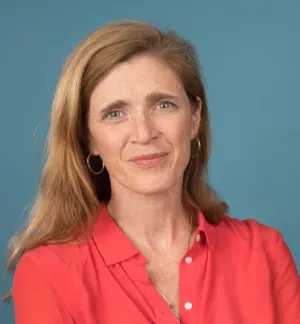
Mr. President, I thank the Kingdom of Jordan for proposing “War, its Lessons, and the Search for a Permanent Peace” as a topic for Security Council debate. In so doing, you have raised profound questions about the role of accountability, the role of the United Nations, and each of our individual and collective responsibilities in preventing and ending deadly conflict.
We know that the opposite of “war” is not “peace.” The opposite of war is “not war.” And we have to remain alert to the chasm between a mere suspension of hostilities and the creation of lasting reconciliation based on the acceptance of a shared historical narrative. The former is the most urgent and achievable goal when conflicts are raging and lives are being lost, but the latter is necessary if we are to improve the likelihood that fighting does not resume.
To move from “not war” to “peace,” communities need to be able to know who did what, how, and why—to move from blaming “Christians” or “Muslims,” “Hutu” or “Tutsi,” “Shia” or “Sunni,” “Dinka” or “Nuer”—communities must begin holding not whole races or religions responsible for their pain, but individuals.
Mr. President, two decades ago, you and I first met when you served as a political officer in the UN peacekeeping mission in Bosnia and I was a journalist reporting on the conflict. We both observed the virulent role the past can play in poisoning relationships between people who have much in common and—at least before the fighting begins—no personal cause for anger. The ironic expressions that made the rounds back then spoke to the role of history in fueling violence: “nothing learned, nothing forgotten” was one saying.
Today, we see countless examples of old, unaddressed grievances boiling over. In Burma, a country that has taken historic strides toward democracy, Muslims continue to feel the effects of a repugnant and deep prejudice that is prevalent across society. This has left the Rohingya without citizenship, vulnerable, and marginalized. Other Muslim populations are finding themselves increasingly isolated from communities with which they’ve lived for decades. These emotions have proven deadly. Over the last weeks, we’ve all seen the alarming reports that Muslims were targeted, and possibly dozens killed in Maungdaw Township in Rakhine State. Last year, we saw similar atrocities in Meiktila. Burma has made positive progress in opening up its political system over the last two or three years, but this kind of violence poses grave risks and must be dealt with before it claims more lives. To do so, there must be a credible and independent investigation into what happened in Maungdaw and there must be justice for the victims. Otherwise, a cycle of violence, grievance, retributive violence, new grievance, more retribution, et cetera, will take root, with each round getting harder to stop than the one before.
Examples of disagreements about the rights and wrongs of the past exist on every continent and may have their origins as far back as antiquity or as near to hand as last night. All too often, we are bedeviled by divergent views of particular acts: one side sees aggression, where the other sees self-defense; one side’s justice is defined by its rival as vengeance; one side’s patriotic gesture is interpreted by its neighbors as disrespect. More broadly, differences of perspective come into play whenever we contemplate the history of the great religions, the rise and fall of colonialism, the two world wars, or any variation of the question, asked in a multitude of contexts: who did what to whom? And, all too often, even when diplomats know the answers, it seems downright undiplomatic to articulate them. We tend to describe outbreaks of violence in the passive voice—“violence erupted” or “intercommunal violence emerged.” We use these phrases because we are afraid to blame. Accountability is easy in the abstract; in practice, it requires a willingness to assign—and in turn, accept—responsibility.
It helps no one when victims are forced to blame their suffering on an entire religious, ethnic, or political faction. Crimes against humanity are committed by individuals, including—no, especially—by those who give these orders then stand back while underlings shed innocent blood. That is why historical records matter. They provide the evidence that can be used to establish personal accountability. And unlike allegations of collective guilt, individual accountability can heal wounds without opening new ones. By developing and preserving historical records, we can help ensure that when disagreements arise, now or in the future, the stakeholders can at least be informed by a common set of facts.
My government agrees that the recovery and protection of such records and the creation of national archives where none exist are useful steps and should be encouraged, and where appropriate, assisted by the UN.
More generally, when seeking to bring opposing sides together, UN representatives should be encouraged to ask hard questions about why conflict began and how it has been prosecuted. UN missions—like national policies—should aim to get at root causes, not just symptoms.
The urgency of this could not be more evident. Just look at the Security Council’s current docket. The Central African Republic has been disintegrating along largely religious lines, despite the fact that the country has not traditionally been prone to sectarian violence. In South Sudan, even with a cessation of hostilities agreement now in place, attacks continue and each ethnic group involved is assigning blame to the other, with personal rivalries only compounding the finger pointing. In Syria, the government’s brutality has extended without limit to torture, executions, indiscriminate bombings, the shredding of medical neutrality, the use of starvation as a weapon of war, and gas attacks against civilians. Terrorist groups have inflicted additional pain on a people that, when they assembled to show support for democracy, they wanted no more than basic dignity for themselves and for their children. That is why the key challenge going forward is to create a transitional body with enough capability and credibility to restore a sense of mutual trust. But we need only put ourselves in the shoes of those who have suffered such brutality—who have lost livelihoods, homes, friends, sons and daughters, mothers and fathers, husbands and wives—to know how hard it will be to trust again. And without accountability, the trust deficit will only grow larger.
The dueling narratives that exist today will continue to fester and polarize, providing oxygen for authoritarians and militants. In each of these cases—the Central African Republic, South Sudan, and Syria—the international community has wisely launched commissions of inquiry to document events, gather eyewitness testimony, and investigate competing claims. And it’s no accident that over the last several years, the United States has supported and the UN system has produced more commissions of inquiry, panels of expert, and related fact-finding bodies than at almost any other time in UN history. We have done so not because there is more war—though, sadly there is far too much war—but because we now all share a better understanding of the role fact-finding and, ultimately, accountability, plays in preventing rampant violence from becoming endless, cyclical, and uncontrollable violence.
Those who posit a tension between justice and peace need look no further than history; the evidence is overwhelming that peace in the absence of justice rarely endures. This is not to suggest that there is a single model for achieving that goal--there are many--, but all begin with the search for truth. This was the case with the war crimes trials following World War II, and it has been the case more recently in—among other places—South Africa, the former Yugoslavia, Rwanda, El Salvador, and Sierra Leone.
Stability and peace begin with our willingness to do what is necessary to deter those who would employ violence to abuse the rights of others. As the fates of Charles Taylor and Ratko Mladic now illustrate, the narratives that are most likely to help douse the embers of conflict are those that put the facts on the public record and the worst offenders behind bars.
One hundred years after shots were fired in Sarajevo, it is entirely appropriate that the Security Council examine the question of how we might “reverse engineer” war in order to understand better its causes and in so doing, what is necessary to achieve a lasting and endurable peace. In the past, we on the Council have shown ourselves capable of learning. We’ve learned to be more comprehensive in our approach to crisis situations. We have become more alert to the threat of genocide and mass atrocities and more aware of religious and cultural factors. We are becoming more proactive in including women in efforts to preserve security and make peace. We have started giving more robust peacekeeping mandates to blue helmets, and the peacekeepers themselves are becoming more creative in their use of technology and new tactics. All of this learning is helpful. None of it is a panacea. The same may be said of ensuring that an accurate and objective record is kept of what happens in our time so that the dangers of bias are minimized and lies are exposed before they become myths.
A wise man once urged us to pray for God’s protection against “those who believe that they are the sole possessors of truth.” King Hussein knew that peace is built on reality and that reality will never mesh perfectly with any one set of perceptions about the present, future, or past. It is this Council’s task to integrate that understanding into the daily business of preventing conflict and nurturing reconciliation. No job could be more difficult, and none more vital.
Thank you.
###
Power, Samantha. “Remarks by Ambassador Samantha Power at a Security Council Open Debate on War, Its Lessons, and the Search for a Permanent Peace.” January 29, 2014


